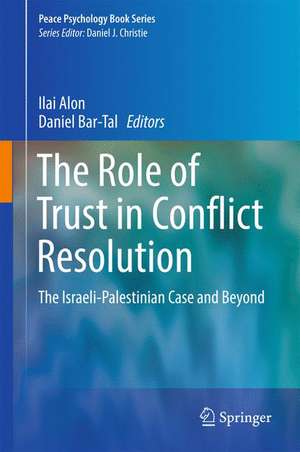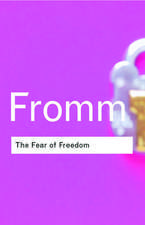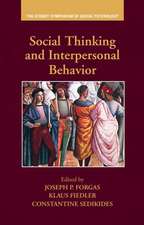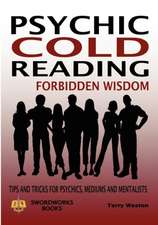The Role of Trust in Conflict Resolution: The Israeli-Palestinian Case and Beyond: Peace Psychology Book Series
Editat de Ilai Alon, Daniel Bar-Talen Limba Engleză Hardback – mar 2017
Built on the premise that trust is one of the most important factors in intergroup relations, conflict management and resolution at large, this volume explores trust and its mechanisms and operations especially in the Israeli-Palestinian conflict. Significantly, this volume focuses not only on the nature of trust and distrust in the Israeli-Palestinian conflict, but it also explores how it is possible to build and increase trust on both sides in the conflict, a necessity in order to advance the stalled peace process.
As trust is a concept that is interdisciplinary by nature, so are this volume’s contributors: sociologists, philosophers, sociologists, social psychologists, political scientists, as well as experts in the Middle East, Islam, Judaism and the Israeli-Palestinian conflict bring together real multidisciplinary perspectives that complement each other and then provide a comprehensive picture about the nature of trust and distrust and its ramification and implications for the Israeli-Palestinian conflict. Divided into five thematic parts, the volume begins with by examining the theoretical basis of trust research from multiple perspectives. Then, it presents chapters on trust, distrust, and trust-building in other conflicts around the world. The third part is a unique feature of this volume as it takes a contextual approach: it emphasizes the importance of particular cultural and religious considerations on both sides of the conflict. The thrust of the book is examined in the next section. Part IV discusses and analyses various aspects of trust, and specifically distrust, in the context of the Israeli-Palestinian conflict. Significantly, the chapters of this part take the perspectives of the participants in the conflict: Israeli Jews, Palestinians and Israeli Arabs.
Finally, the volume concludes by providing an integrative conceptual perspective based on the principles of social andpolitical psychology. An important goal of this volume is to not only explore trust and distrust in an intractable conflict, but also to provide practical multi-disciplinary outlooks and implications to advance trust building in two conflict ridden societies—Israeli and Palestinian, and other societies around the world.
| Toate formatele și edițiile | Preț | Express |
|---|---|---|
| Paperback (1) | 644.18 lei 43-57 zile | |
| Springer International Publishing – 12 iul 2018 | 644.18 lei 43-57 zile | |
| Hardback (1) | 650.37 lei 43-57 zile | |
| Springer International Publishing – mar 2017 | 650.37 lei 43-57 zile |
Din seria Peace Psychology Book Series
- 18%
 Preț: 779.26 lei
Preț: 779.26 lei -
 Preț: 361.05 lei
Preț: 361.05 lei - 15%
 Preț: 639.25 lei
Preț: 639.25 lei - 18%
 Preț: 788.54 lei
Preț: 788.54 lei - 15%
 Preț: 699.28 lei
Preț: 699.28 lei - 15%
 Preț: 646.62 lei
Preț: 646.62 lei - 18%
 Preț: 1690.13 lei
Preț: 1690.13 lei - 15%
 Preț: 645.28 lei
Preț: 645.28 lei - 24%
 Preț: 1044.84 lei
Preț: 1044.84 lei - 18%
 Preț: 945.14 lei
Preț: 945.14 lei - 15%
 Preț: 649.54 lei
Preț: 649.54 lei -
 Preț: 386.39 lei
Preț: 386.39 lei - 15%
 Preț: 697.82 lei
Preț: 697.82 lei - 15%
 Preț: 591.14 lei
Preț: 591.14 lei - 18%
 Preț: 1222.94 lei
Preț: 1222.94 lei - 15%
 Preț: 644.82 lei
Preț: 644.82 lei - 15%
 Preț: 649.22 lei
Preț: 649.22 lei - 15%
 Preț: 697.65 lei
Preț: 697.65 lei -
 Preț: 388.72 lei
Preț: 388.72 lei - 15%
 Preț: 647.08 lei
Preț: 647.08 lei - 24%
 Preț: 967.02 lei
Preț: 967.02 lei - 15%
 Preț: 638.89 lei
Preț: 638.89 lei - 18%
 Preț: 733.15 lei
Preț: 733.15 lei -
 Preț: 398.74 lei
Preț: 398.74 lei - 15%
 Preț: 644.30 lei
Preț: 644.30 lei - 18%
 Preț: 1116.57 lei
Preț: 1116.57 lei -
 Preț: 365.05 lei
Preț: 365.05 lei - 15%
 Preț: 643.99 lei
Preț: 643.99 lei - 18%
 Preț: 1116.26 lei
Preț: 1116.26 lei - 18%
 Preț: 1381.26 lei
Preț: 1381.26 lei - 18%
 Preț: 1595.75 lei
Preț: 1595.75 lei - 18%
 Preț: 779.89 lei
Preț: 779.89 lei
Preț: 650.37 lei
Preț vechi: 765.14 lei
-15% Nou
Puncte Express: 976
Preț estimativ în valută:
124.44€ • 130.28$ • 102.97£
124.44€ • 130.28$ • 102.97£
Carte tipărită la comandă
Livrare economică 07-21 aprilie
Preluare comenzi: 021 569.72.76
Specificații
ISBN-13: 9783319433547
ISBN-10: 3319433547
Pagini: 454
Ilustrații: XXVI, 345 p. 12 illus., 9 illus. in color.
Dimensiuni: 155 x 235 x 22 mm
Greutate: 0.69 kg
Ediția:1st ed. 2016
Editura: Springer International Publishing
Colecția Springer
Seria Peace Psychology Book Series
Locul publicării:Cham, Switzerland
ISBN-10: 3319433547
Pagini: 454
Ilustrații: XXVI, 345 p. 12 illus., 9 illus. in color.
Dimensiuni: 155 x 235 x 22 mm
Greutate: 0.69 kg
Ediția:1st ed. 2016
Editura: Springer International Publishing
Colecția Springer
Seria Peace Psychology Book Series
Locul publicării:Cham, Switzerland
Cuprins
Trust and Distrust: Introduction
Alon, Ilai and Bar-Tal, Daniel
Part I – Theoretical Aspects: Trust in Conflict Resolution
1. The Philosophy of Trust
Agassi, Joseph
2. Two Theoretical Approaches to Trust - Their Implications for the Resolution of Intergroup Conflict
Sztompka, Piotr
3. Effects of Expectations, Type of Relationship and Prior Injustice on Trust Honoring: A Strategic-Experimental ApproachSuleiman, Ramzi
Part II - the Comparative Aspect: How was Trust been reached in other Conflicts.
4. Lessons learned on Trust Building in Northern Ireland
Fitzduff, Mari
5. Determinants of Post-Conflict Trust: The Role of Ethnic Identity, Personal and Collective Victimization and Intergroup Emotions
Corkalo Biruski, Dinka
Part III – the Cultural-Religious Aspect: Trust in Islam and Judaism
6. Some Comments on Language as A Barrier to Trust in Arabic-Speaking Islam
Alon, Ilai
7. Usual Suspects: On Trust, Doubt and Ethnicity in the Mishnah
Rosen-Zvi, Ishay
Part IV – Trust in the Israeli – Palestinian Conflict
8. Trust and Mistrust in Israeli Peace-MakingGolan, Galia
9. The Role of Trust in the Arab-Israeli Conflict
Yuchtman-Yaar, Ephraim
10. Trust and Negotiations: Israel and the Palestinians, 2009-2016Tzoreff, Yohanan
11. Lay Psychology of Trust/Distrust and beyond in the Context of an Intractable Conflict: the Case of Israeli Jews
Bar-Tal, Daniel; Amiram Raviv, Paz Shapira, and Dennis Kahn
12. Lack of Trust as a Barrier to Reconciliation in the Israeli-Palestinian Conflict: Attitudes of Israeli (Jewish) Elite Members toward Reconciliation with the Palestinians
Auerbach, Yehudith
13. Historical Narratives and the Issue of Trust
Susser, Asher
14. Trust and Confidence Building in the Israeli Palestinian Peace Negotiations
Salem, Walid
15. Trust, Ethics andIntentionality in Conflict Transformation and Reconciliation
Jamal, Amal
16. Distrust and Discord on the Israeli-Arab Conflict between Arabs and Jews in Israel
Smooha, Sammy
Part V – Lessons and Conclusions
Socio-Psychological Approach to Trust (or Distrust): Concluding Comments
Bar-Tal, Daniel and Alon, Ilai
Alon, Ilai and Bar-Tal, Daniel
Part I – Theoretical Aspects: Trust in Conflict Resolution
1. The Philosophy of Trust
Agassi, Joseph
2. Two Theoretical Approaches to Trust - Their Implications for the Resolution of Intergroup Conflict
Sztompka, Piotr
3. Effects of Expectations, Type of Relationship and Prior Injustice on Trust Honoring: A Strategic-Experimental ApproachSuleiman, Ramzi
Part II - the Comparative Aspect: How was Trust been reached in other Conflicts.
4. Lessons learned on Trust Building in Northern Ireland
Fitzduff, Mari
5. Determinants of Post-Conflict Trust: The Role of Ethnic Identity, Personal and Collective Victimization and Intergroup Emotions
Corkalo Biruski, Dinka
Part III – the Cultural-Religious Aspect: Trust in Islam and Judaism
6. Some Comments on Language as A Barrier to Trust in Arabic-Speaking Islam
Alon, Ilai
7. Usual Suspects: On Trust, Doubt and Ethnicity in the Mishnah
Rosen-Zvi, Ishay
Part IV – Trust in the Israeli – Palestinian Conflict
8. Trust and Mistrust in Israeli Peace-MakingGolan, Galia
9. The Role of Trust in the Arab-Israeli Conflict
Yuchtman-Yaar, Ephraim
10. Trust and Negotiations: Israel and the Palestinians, 2009-2016Tzoreff, Yohanan
11. Lay Psychology of Trust/Distrust and beyond in the Context of an Intractable Conflict: the Case of Israeli Jews
Bar-Tal, Daniel; Amiram Raviv, Paz Shapira, and Dennis Kahn
12. Lack of Trust as a Barrier to Reconciliation in the Israeli-Palestinian Conflict: Attitudes of Israeli (Jewish) Elite Members toward Reconciliation with the Palestinians
Auerbach, Yehudith
13. Historical Narratives and the Issue of Trust
Susser, Asher
14. Trust and Confidence Building in the Israeli Palestinian Peace Negotiations
Salem, Walid
15. Trust, Ethics andIntentionality in Conflict Transformation and Reconciliation
Jamal, Amal
16. Distrust and Discord on the Israeli-Arab Conflict between Arabs and Jews in Israel
Smooha, Sammy
Part V – Lessons and Conclusions
Socio-Psychological Approach to Trust (or Distrust): Concluding Comments
Bar-Tal, Daniel and Alon, Ilai
Notă biografică
Dr. Ilai Alon is a retired associate professor at Tel Aviv University's departmet of philosophy. Education at the Hebrew University and Oxford University, Wolfosn College (1968-1970.) The major topics – (1) Arabic language and literature; (2) Philosophy. He served as a visiting researcher at Stanford University, and as a visiting professor at Princeton, Harvard, Lehigh (Pennsylvania,) Carlton (Ottawa.)
Dr. Daniel Bar-Tal is Branco Weiss Professor of Research in Child Development and Education at the School of Education, Tel Aviv University. His research interest is in political and social psychology studying socio-psychological foundations of intractable conflicts and peace building, as well as development of political understanding among children and peace education.
Textul de pe ultima copertă
Built on the premise that trust is one of the most important factors in intergroup relations, conflict management and resolution at large, this volume explores trust and its mechanisms and operations especially in the Israeli-Palestinian conflict. Significantly, this volume focuses not only on the nature of trust and distrust in the Israeli-Palestinian conflict, but it also explores how it is possible to build and increase trust on both sides in the conflict, a necessity in order to advance the stalled peace process.
As trust is a concept that is interdisciplinary by nature, so are this volume’s contributors: sociologists, philosophers, social psychologists, political scientists, as well as experts in the Middle East, Islam, Judaism and the Israeli-Palestinian conflict bring together real multidisciplinary perspectives that complement each other and then provide a comprehensive picture about the nature of trust and distrust and its ramifications and implications for the Israeli-Palestinian conflict. Divided into five thematic parts, the volume begins with by examining the theoretical basis of trust research from multiple perspectives. Then, it presents chapters on trust, distrust, and trust-building in other conflicts around the world. The third part is a unique feature of this volume as it takes a contextual approach: it emphasizes the importance of particular cultural and religious considerations on both sides of the conflict. The thrust of the book is examined in the next section. Part IV discusses and analyses various aspects of trust, and specifically distrust, in the context of the Israeli-Palestinian conflict. Significantly, the chapters of this part take the perspectives of the participants in the conflict: Israeli Jews, Palestinians and Israeli Arabs.
Finally, the volume concludes by providing an integrative conceptual perspective based on the principles of social and political psychology. An important goal of this volume is to not only explore trust and distrust in an intractable conflict, but also to provide practical multi-disciplinary outlooks and implications to advance trust building in two conflict ridden societies—Israeli and Palestinian, and other societies around the world.
Caracteristici
Editors and contributors have impeccable and interdiscplinary scholarly credentials, including Dr. Daniel Bar-Tal who is a preeminent scholar in political psychology and the Israeli-Palestinian peace process, and Yohanan Tzoreff, Head of the Palestinian section at the Ministry of Intelligence and Strategy Offers a thoroughgoing treatment of theoretical conceptions of trust from a psychological perspective Provides practical implications for improving intergroup relations in a wide array of global conflicts Includes supplementary material: sn.pub/extras













